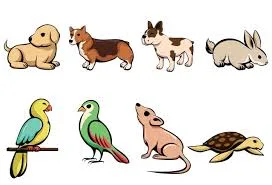Pet animal and care- Companion and best Friendship with human
Pet animal
The concept of having pets has been a part of human culture for thousands of years. These animals often become valued members of our families and bring joy and companionship to our lives. Here are some details about popular pets:
Here’s a more detailed guide on caring for common Pet animal
1. Pet animal Dogs:
Dogs are known for their loyalty, intelligence, and diverse personalities. They come in various breeds, each with its own characteristics and needs. Dogs require social interaction, exercise, training, and proper nutrition. They serve as loyal companions, working animals (such as service dogs, herding dogs, and police dogs), and even perform in dog sports and shows.

- Food and Water:
- Choose high-quality dog food appropriate for your dog’s age, size, and activity level.
- Provide fresh water in a clean bowl at all times.
- Monitor your dog’s weight and adjust their food portions accordingly.
- Exercise:
- Dogs need regular exercise for physical and mental health. The amount varies by breed, but daily walks and playtime are essential.
- Off-leash time in a secure area or a dog park can provide additional stimulation.
- Grooming:
- Brush your dog’s coat regularly to prevent matting and reduce shedding.
- Bathe your dog as needed, typically every few months or when they get dirty.
- Trim nails when they get too long to avoid discomfort.
- Healthcare:
- Keep up with vaccinations, as recommended by your veterinarian.
- Use flea and tick preventatives.
- Schedule regular check-ups with a veterinarian, at least once a year.
- Discuss spaying or neutering options with your vet if your dog is not already altered.
- Training:
- Basic obedience training is important for safety and well-behaved behavior.
- Socialize your dog with other dogs and people from a young age to prevent aggression and fearfulness.
- Love and Attention:
- Dogs are social animals and need companionship.
- Spend quality time with your dog, engage in interactive play, and offer affection.

2. Pet animal Cats: Cats are known for their independent nature, grace, and playful behavior. They come in different breeds, each with unique traits. Cats are relatively low-maintenance compared to dogs but still need proper care, including feeding, litter box maintenance, grooming, and regular veterinary check-ups.
- Food and Water:
- Choose high-quality cat food, either dry kibble or wet food.
- Provide fresh water in a clean bowl at all times.
- Litter Box:
- Keep the litter box clean by scooping waste daily and changing the litter regularly.
- Place the litter box in a quiet, accessible location.
- Grooming:
- Brush your cat’s coat regularly to prevent matting and hairballs.
- Some long-haired breeds may require more frequent grooming.
- Healthcare:
- Ensure your cat is up-to-date on vaccinations and receives regular check-ups.
- Use flea and tick preventatives.
- Spay or neuter your cat if not already altered.
- Play:
- Cats need mental and physical stimulation. Provide toys, scratching posts, and interactive play.
- Independence:
- Cats enjoy alone time but also appreciate human companionship on their terms.
Follow Our Digiknowledge.co.in Page for Latest update about Bikes, Cars, Sports, Government Policy and many more.
3. Pet Fish:
Aquatic Pets: Fish, freshwater snails, and saltwater snails are popular aquatic pets. Fish tanks must have suitable water conditions and filtration systems. Different fish species have varying requirements in terms of tank size and water parameters.
- Tank Setup:
- Choose an appropriate tank size and shape for the fish species you have.
- Install a suitable filter and heater, if necessary.
- Maintain proper water parameters (temperature, pH, ammonia levels, etc.).
- Water Quality:
- Regularly monitor water quality with test kits and perform water changes as needed.
- Clean the tank and decorations to prevent algae and waste buildup.
- Feeding:
- Feed your fish an appropriate diet for their species. Avoid overfeeding, as it can lead to water quality issues.
- Healthcare:
- Watch for signs of illness, like changes in behavior, appetite, or appearance.
- Quarantine sick fish to prevent the spread of disease to other tankmates.
- Compatibility:
- Ensure that the fish in your tank are compatible in terms of size, temperament, and water requirements.
4. Pet Birds:
Birds: Parrots, passerines, and fowls are common pet birds. They can be colorful and have varied personalities. Birds need spacious cages, a balanced diet, social interaction, and mental stimulation. Some birds are skilled mimics and can learn to talk.
- Cage:
- Provide a spacious cage with horizontal bars for climbing.
- Include perches, toys, and swings for mental stimulation.
- Diet:
- Offer a varied diet of pellets, seeds, fresh fruits, and vegetables.
- Avoid giving birds foods that are toxic to them, such as chocolate or avocado.
- Social Interaction:
- Spend time with your bird daily. They are social animals and need interaction and mental stimulation.
- Toys and Enrichment:
- Rotate toys to prevent boredom. Birds enjoy puzzles, mirrors, and foraging toys.
- Provide opportunities for flying and exercise outside of the cage.
- Healthcare:
- Schedule regular vet check-ups and keep an eye out for signs of illness, such as changes in behavior or feather condition.
5. Pet animal Small Mammals (e.g., rabbits, guinea pigs, hamsters):
Rabbits: Rabbits are gentle and sociable pets. They require spacious enclosures, a balanced diet of hay, fresh vegetables, and pellets, and regular grooming. Rabbits are often kept indoors or in secure outdoor hutches.

- Habitat:
- Provide a clean and spacious cage or enclosure with proper bedding.
- Ensure good ventilation and protection from extreme temperatures.
- Diet:
- Offer a balanced diet of pellets, fresh hay, and fresh vegetables or fruits.
- Avoid high-calcium diets for certain small mammals to prevent urinary issues.
- Exercise:
- Allow for supervised exercise outside of their enclosure in a safe and secure area.
- Provide exercise wheels, tunnels, and toys within their habitat.
- Socialization:
- Some small mammals, like guinea pigs, enjoy companionship and should be kept in pairs or groups.
- Healthcare:
- Clean the habitat regularly to prevent odor and disease.
- Monitor for signs of illness, like changes in appetite, activity level, or appearance.
6. Pet Reptiles (e.g., turtles, snakes, lizards):
Reptiles: Turtles, lizards, snakes, and iguanas are reptiles kept as pets. They have specific habitat and temperature requirements. Proper research is crucial to ensure their well-being. Some reptiles, like turtles, have long lifespans.
- Habitat:
- Maintain an appropriate enclosure with the right temperature, humidity, and substrate for your reptile species.
- Provide hiding spots and appropriate lighting, including UVB if necessary.
- Diet:
- Feed a diet suitable for the species, which may include live or frozen prey, insects, or vegetation.
- Research your specific reptile’s dietary needs.
- Hydration:
- Provide a water source for drinking and bathing.
- Some reptiles require a humid hide or misting to maintain proper hydration.
- Healthcare:
- Monitor your reptile’s behavior and appearance for signs of illness.
- Ensure their enclosure is clean and free of feces and uneaten food.
- 7. Pet animal Rodents:
- Gerbils, hamsters, chinchillas, rats, mice, and guinea pigs are small mammals that are often kept as pets. They require appropriate housing, bedding, a balanced diet, and social interaction. Some rodents, like guinea pigs, thrive in pairs or groups.
Aquatic Pets: Fish, freshwater snails, and saltwater snails are popular aquatic pets. Fish tanks must have suitable water conditions and filtration systems. Different fish species have varying requirements in terms of tank size and water parameters.
Amphibians: Frogs and salamanders are amphibians that can be kept as pets. They need an appropriate habitat with access to both water and land, as well as a diet that may include live insects.
Arthropods: Tarantulas and hermit crabs are arthropod pets that require specialized enclosures, temperature, and humidity control. They are often kept by enthusiasts interested in exotic pets.
Equine and Bovine: Horses and cows are among the largest companion Pet animal, They are kept for various purposes, including as pets, working animals, or for recreational riding. Their care involves proper nutrition, shelter, exercise, and veterinary care.
Pet animal bring comfort, companionship, and sometimes even therapeutic benefits to their owners. However, owning a pet also comes with responsibilities, including providing proper care, socialization, and attention. It’s essential to research the specific needs of any pet you plan to adopt and ensure you can meet those requirements to ensure their well-being and happiness.
Always consult with a veterinarian who specializes in the care of the specific type of Pet animal you have for personalized guidance on their healthcare needs and any specific care requirements. Proper care and attention will help your pets lead healthy and happy lives.
Which are the most Pet animal ?
Dogs are the most popular pet in the U.S. (65.1 million U.S. households own a dog), followed by cats (46.5 million households) and freshwater fish (11.1 million households).
Name the various famous dogs Breeds ?
English foxhounds.
Norwegian lundehunds.
Sloughis.
American foxhounds.
Belgian laekenois.
Azawakhs.
Harriers.
Sussex spaniels.
What is the richest Pet animal ?
After her death in 1992, the German Countess Karlotta Leibenstein willed her fortune of USD 80 million (INR 6,58 crores approximately) to her beloved dog Gunther III. The amount kept growing with smart investments around the world under Gunther Corporation, which now owns Gunther VI, the world’s richest pet.




